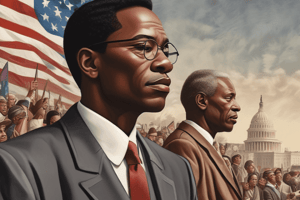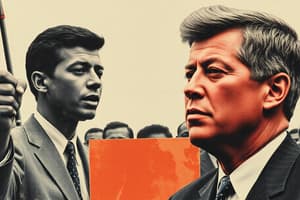Podcast
Questions and Answers
What was a significant outcome of Kennedy's address on the political climate regarding civil rights?
What was a significant outcome of Kennedy's address on the political climate regarding civil rights?
It inspired further activism and highlighted the necessity for legislative change.
In what ways did Kennedy's speech aim to influence the legislative agenda for civil rights?
In what ways did Kennedy's speech aim to influence the legislative agenda for civil rights?
The speech sought to bolster support for civil rights legislation and called for federal commitment to equality under the law.
What role did Kennedy acknowledge regarding the potential for violence in the civil rights struggle?
What role did Kennedy acknowledge regarding the potential for violence in the civil rights struggle?
He recognized the necessity for change amid the persistent potential for violence.
Why is Kennedy's speech considered a significant part of American history?
Why is Kennedy's speech considered a significant part of American history?
How did Kennedy's speech move beyond rhetoric in its call for action?
How did Kennedy's speech move beyond rhetoric in its call for action?
What moral injustices did Kennedy address in his Civil Rights speech?
What moral injustices did Kennedy address in his Civil Rights speech?
How did Kennedy's speech respond to the civil rights demonstrations occurring at the time?
How did Kennedy's speech respond to the civil rights demonstrations occurring at the time?
What legislative actions did Kennedy propose in his address?
What legislative actions did Kennedy propose in his address?
What foundational American values did Kennedy invoke in his speech?
What foundational American values did Kennedy invoke in his speech?
In what ways did Kennedy emphasize federal responsibility in civil rights?
In what ways did Kennedy emphasize federal responsibility in civil rights?
What significance did Kennedy attribute to the timing of his Civil Rights speech?
What significance did Kennedy attribute to the timing of his Civil Rights speech?
How did Kennedy link the current civil rights struggle to historical American struggles?
How did Kennedy link the current civil rights struggle to historical American struggles?
What impact did Kennedy's Civil Rights address have on public opinion?
What impact did Kennedy's Civil Rights address have on public opinion?
Flashcards
Kennedy's 1963 Civil Rights Address
Kennedy's 1963 Civil Rights Address
A crucial moment in the Civil Rights Movement where President Kennedy addressed racial injustice and advocated for federal action against discrimination.
Racial discrimination
Racial discrimination
Unjust treatment or prejudice based on race.
Civil Rights Legislation
Civil Rights Legislation
Laws designed to protect and promote equal rights for all citizens, especially African Americans.
Federal intervention
Federal intervention
Signup and view all the flashcards
Constitutional rights
Constitutional rights
Signup and view all the flashcards
Civil rights movement
Civil rights movement
Signup and view all the flashcards
Pivotal moment
Pivotal moment
Signup and view all the flashcards
U.S. Constitution
U.S. Constitution
Signup and view all the flashcards
Kennedy's Call for Action
Kennedy's Call for Action
Signup and view all the flashcards
Impact on Public Opinion
Impact on Public Opinion
Signup and view all the flashcards
Political Momentum for Change
Political Momentum for Change
Signup and view all the flashcards
Legacy of the Speech
Legacy of the Speech
Signup and view all the flashcards
Government Commitment to Equality
Government Commitment to Equality
Signup and view all the flashcards
Study Notes
Kennedy's Civil Rights Address of 1963
- The address, delivered on June 11, 1963, was a pivotal moment in the evolving Civil Rights Movement.
- Kennedy acknowledged the moral injustices of racial discrimination and presented a strong federal response.
- The speech outlined the government's commitment to ensuring equal rights and opportunities for African Americans.
- It emphasized the importance of upholding constitutional rights for all citizens.
- Kennedy stressed the need for legislative action to combat discrimination.
- The address focused on the inherent right to equal treatment irrespective of race.
Context of the Address
- The speech stemmed from escalating racial tensions and violence against African Americans in the South.
- Significant civil rights demonstrations and protests were taking place across the nation.
- Events like the Freedom Rides and sit-ins highlighted the plight of African Americans struggling for equality.
- The ongoing struggle for equal access to education, employment, and public facilities fueled Kennedy's determination to act.
- The president recognised that change required support from both the federal government and society as a whole.
Key Arguments of the Speech
- Kennedy argued that racial discrimination violated basic American values and the Constitution.
- He highlighted the importance of upholding the principles of justice and equality.
- He emphasized the role of the federal government in safeguarding these rights.
- The address advocated for the passage of comprehensive civil rights legislation.
- Kennedy requested a strong response from Congress. He identified the requirement for federal intervention to actively address these issues.
- He stressed the need for American society to address the injustices based on race.
Proposed Legislative Action
- Kennedy called for stronger federal action to enforce existing laws.
- He outlined specific measures, but the full scope and details will be explored in a future executive order.
- The speech showcased awareness of the urgent need for broader legislative changes.
- The address aimed to mobilize public opinion behind the needed civil rights reforms.
- He underscored the gravity of the situation by drawing parallels between the current struggles and earlier struggles of American history.
Impact and Reception
- The speech marked a significant turning point in the Civil Rights Movement.
- It galvanized support for civil rights legislation.
- It inspired further activism and participation in the fight for equality.
- The address had a strong effect on the political climate.
- Kennedy recognized the necessity for change and the potential for violence that continued to exist.
Aftermath and Legacy
- The speech played a crucial role in shaping public opinion on the Civil Rights Movement.
- It helped bolster the legislative agenda for civil rights legislation.
- Though impactful, the full scale of the legislation required further political action from the Congress.
- The speech remains a significant part of American history that reflected an ongoing struggle for equality.
Speech's Focus on Action
- Kennedy called for federal intervention in addressing racial discrimination.
- The address emphasized the need for a clear government commitment to the principle of equal application of the law.
- The president presented a clear and compelling case for action in the legislative arena.
- The speech aimed to move beyond rhetoric to concrete steps for change.
Studying That Suits You
Use AI to generate personalized quizzes and flashcards to suit your learning preferences.




